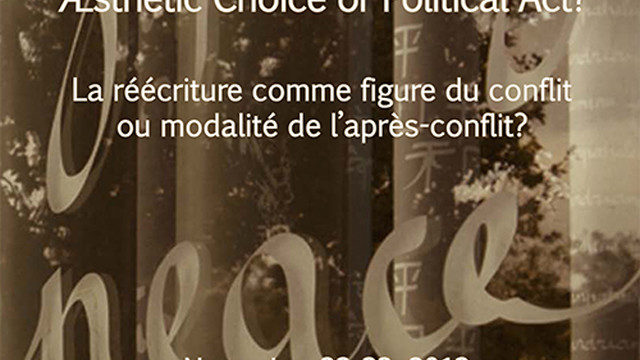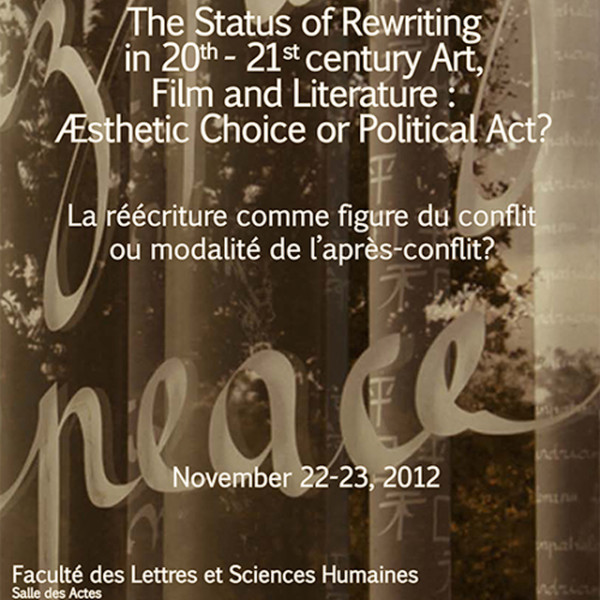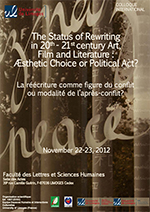
Rewriting – Colloque – 22-23 novembre 2012
« The status of rewriting in 20th –21st century art, film and literature in English : aesthetic choice or political act? »
FLSH, Limoges
22-23 novembre 2012
EA 1087 Ehic (Espaces Humains et Interactions Culturelles) is pleased to announce the organisation of a conference entitled The status of rewriting in 20th –21st century art, film and literature in English : aesthetic choice or political act? to be held at the University of Limoges (France) on November 22-23, 2012.
Rewriting appears as a protean figure of renewal, in which a large part of contemporary literary analysis and theory seems to be grounded. It is however of particular interest in situations that follow a conflict (whether armed or not), when various artistic media (literature, the visual arts, films) may contribute to renegotiating, or even to rewriting the traumas of the past. Artistic rewriting may even try to set them right, or heal them, by addressing for instance the ethical questions fiction encounters when it is reified into “classics”, i.e. works whose political, cultural or even artistic specificities in a precise context tend to be erased by their status, or by giving a voice to those who were forced to silence in such “classics”.
Rewriting, it has been argued, corresponds to the ethos of our time – summarizing our way of passing stories and history to the next generation. In Postmodernism or the Cultural Logic of Late Capitalism, Fredric Jameson contends that, in our post-modern world, rewriting/parody boils down to pastiche and therefore has no critical dimension. His main reproach is that in such a situation, history and the past become meaningless: “the past as ‘referent’ finds itself gradually bracketed, and then effaced altogether, leaving us with nothing but texts.” But our world is not only post-modern, it is also the site of endless conflicts which are mirrored in the artistic production. We would therefore like to explore those situations when rewriting, on the contrary, roots artistic productions in a historical context that cannot be left aside or forgotten. In such a context, history and the work of memory rather seem to be part and parcel of the artistic stakes of rewriting, hesitating between the temptation to repeat past conflicts (hopefully with a difference) and the desire to overcome them, at times displacing tensions onto the artistic scene.
We would like to address the question of rewriting in-between politics and aesthetics in the English-speaking/writing world and to see what sort of potential influence what may at first glance look like a very autotelic game has or may have on reality. Contributors are invited to explore the issue, dealing for example with the following questions:
– How do rewritings or parodies mirror these “post-conflict” situations, when politics and aesthetics intermingle so closely?
– What is their status?
– Is there not a danger for rewriting to become a stereotype of literary/artistic production that keeps its eyes turned towards the past rather than imagines a future?
– Does, as Jameson contends, the mediation of literature/art preclude the possibility of tackling the historical stakes seriously?
– Or do historical, political and ethical stakes limit aesthetic preoccupations in rewritings?


